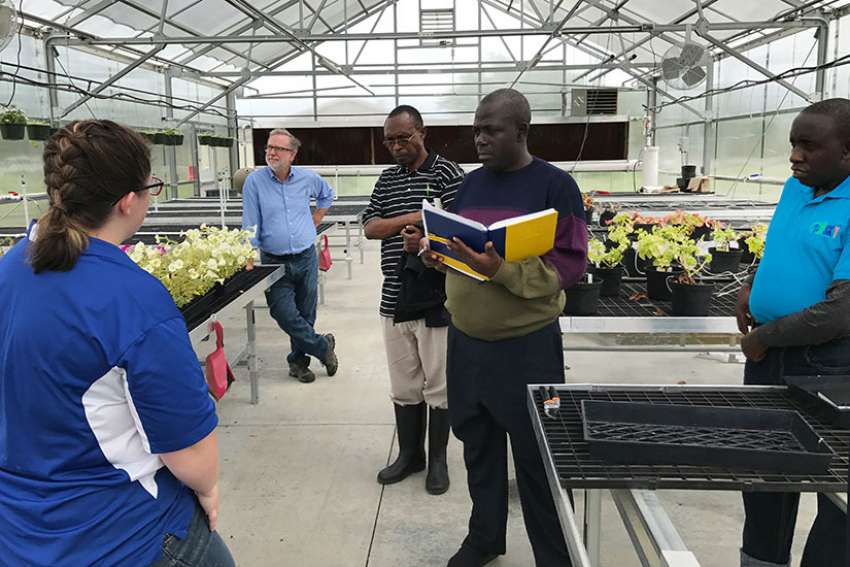If entire generations of children and teenagers are taught the ins and outs of agriculture, they change the world around them, creating a culture of food stability and economic growth.
This mentality and curriculum is what Uganda representatives from the Gayaza Girls High School are implementing thanks to a collaboration with Future Farmers of America coordinated by Catholic Relief Services, the U.S. bishops' overseas relief and development agency.
"Our aim is to help improve food security in communities," said Bruce White, CRS' project director of the Farmer to Farmer Program for East Africa. "The whole idea of finding a way to educate youth on agriculture and make a business from it is really powerful."
It was four days of learning and discussion for all during the Arkansas Future Farmers of America Convention June 6-9, where an international delegation from Uganda visited to learn how to establish a structured agricultural education in their country.
"My interest is seeing that every child who steps in school grows a passion for agriculture," through knowledge and activities, said Ronald Ddungu, deputy head teacher of academics and innovations at Gayaza.
CRS helped make the connection between their staff in Uganda and Future Farmers of America in the spring 2016. George Ntibarikure, agriculture adviser for CRS in Uganda, visited an agriculture education program in North Carolina and was impressed by the knowledge and business-minded work of the students and teachers. Ntibarikure said he was particularly impressed when he discussed agriculture with a student who knew not only the mechanics of the trade, but the business side.
While Uganda is predominantly an agricultural country, younger youth did not have any training. White said agriculture is often seen as "a road to poverty," yet this program will show that there is vast economic opportunity.
"We're trying to get the youth, those in high school, to grow in that culture" before college, Ntibarikure told the Arkansas Catholic, newspaper of the Diocese of Little Rock.
After the visit, CRS helped bring educators from various regions of the national FFA to Uganda in the fall, including Nina Crutchfield, a local program success specialist for 10 years for the national FFA organization and member of St. Albert Church in Heber Springs. National FFA members shared industry insights and the model that teachers in the U.S. use to educate agriculture students. A set of recommendations was passed along and the progress was discussed during the convention.
White said bringing the delegation to the U.S. is a direct result of "Catholic pew donation," which allowed this program to begin.
The program – styled after the Future Farmers of America program and dubbed Youth Future Farmers of Africa, Uganda – has started at the Gayaza Girls High School in Kampala, the oldest and one of the most revered girls school in the country, sitting on more than 90 acres of land. More than 34 other schools have started the clubs in their schools in the surrounding regions, with monetary help from local and global organizations, as well as money raised by students.
An annual farm camp experience allows students to put into practice what they've learned, from plowing fields, helping a cow give birth, harvesting and having projects or fun activities for friendly competition. Technical speakers also are invited to share their knowledge about the agriculture industry.
The fourth annual farm camp will be held in August, where about 200 youth and 50 teachers are expected to attend.
In April, the school hosted a farm carnival for the first time, with proceeds divided between the farm and students, said Brian Kibirige, farm manager at Gayaza.
"I'm happy to be in this discussion … and just to see the youth excited," he said.
The program not only includes high school students, but grade schoolers, called Young FFA Uganda, and teachers, called Teachers and Educators FFA Uganda.
While Gayaza had set up a farmer's club, it is the long-term structure – the educational side – that the delegation is interested in establishing.
"We need to make the teachers the practitioners," said Ddungu, who is a driving force for the program.
Once teachers are dedicated to agricultural curriculum, it'll make the students more involved and having a uniform system that guarantees students that go through the program come out with a certain set of skills and knowledge is the goal, he added.
Crutchfield, who taught agriculture education for 14 years, said watching this new organization form is a glimpse of what it must have been like when the Future Farmers of America was being formed more than 80 years ago.
"God's providence is in it all. I never dreamed my passion for teaching and youth, being Catholic and my job all would intersect at the same time," she said.
Creating food stability is essential for any nation, which all "goes back to Catholic teaching. … When people aren't hungry, they aren't fighting," she added.

